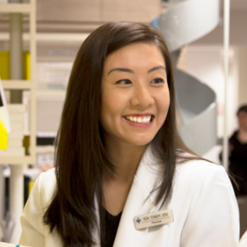In this month’s issue, PSS Hospital Chapter interviews Dr Koh Tsingyi (BSc (Pharm) Hons, Pharm D, BCPPS), who is our expert in transplant from the National University Hospital, with a wealth of 11 years of experience in Pharmacy and 10 years particularly in the area of transplant.
What are some of your day to day duties e.g. special services, rounds that are offered in your pharmacy?
The transplant pharmacist at NUH provide care for patients who are awaiting, or have received kidney, liver and pancreas transplants. I attend daily ward rounds with the multidisciplinary transplant teams to provide advice on medication management to optimize patient clinical outcomes. In addition, I see patients in clinic on a daily basis for routine pre- or post-transplant follow up. In the ambulatory setting, the pharmacist not only performs medication reconciliation and education, but also plays an integral role in health maintenance of the transplant patients. This includes managing the patients’ glucose, lipids, blood pressure, bone health, electrolytes and ensuring vaccinations are up-to-date. For all newly transplanted patients, a specialized discharge counselling session is provided to the patient and their family/care takers by the transplant pharmacist to ensure that medications are taken correctly and appropriately.
What are some of the challenges that pharmacists working in your specialty might face and what are the approaches to overcome these challenges?
One of the biggest challenge in the area of transplantation is the lack of evidence and established guidelines, especially in the Asian setting. I often describe managing transplant patients as an art. Transplant patients display large inter- and intra-patient variability, making it difficult to have a “one size fits all” approach. Each patient’s immunosuppressive therapy is individualized to their immunological risk, infection risk, co-morbidities and drug interactions. Pharmacokinetic and pharmacodynamics interactions are common in the transplant population due to the immunosuppressive drugs that are used. The transplant pharmacist will need to have a deep appreciation for drug-drug and drug-food interactions and should be well equipped with knowledge in the management of various chronic diseases and how it interacts with a transplant patient’s immunosuppressive state.
As an expert in your specialty, what are some of the latest practice updates/ resources which you would like to highlight to fellow pharmacists who want to learn more about your field of practice?
As eluded to earlier, there are no specific guidelines that universally used in transplantation. Primary literature is used commonly. However, each of the authoritative medical societies like the American Transplant Society (ATS), The Transplantation Society (TTS), European Association for the Study of the Liver (EASL), KDIGO etc have published guidelines on the care for transplant recipients. There are also guidelines published by various authors on the management of specific post-transplant complications like viral infections, new-onset diabetes after transplant (NODAT) and renal dysfunction. In addition, the National University Hospital recently published a MEDICO issue on transplantation which covers many of the recent transplant topics (Click here to access article).
Is there anything else that you would like to share e.g. words of advice regarding your specialty?
Transplantation is a highly sophisticated field that has been experiencing growing success in patient outcomes, improving patient’s quality of life and extending patient’s life span greatly. This has been a result of superior surgical techniques and advances in immunosuppressive therapies over the past few decades. It will become increasingly common to encounter a transplanted patient in the community. Drug related problems are common in the transplant recipient due to the complexity of their medication regimens. Every pharmacist can play an important role in the care of the transplant recipient and preventing drug related problems by identifying drug-drug interactions and providing recommendations on the selection of medications and dosing adjustments. More importantly, pharmacists can provide patient education and counselling on medication adherence, which is one of the key components in preventing allograft rejection and graft loss.

Dr Koh Tsingyi (Pharm D, BCPS)
Principal Pharmacist (Clinical)
National University Hospital


